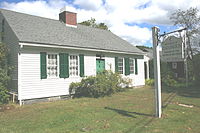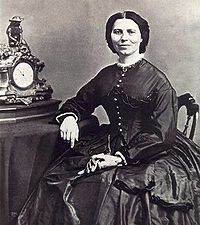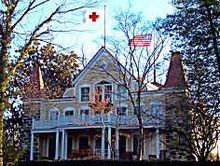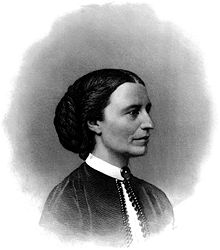- Clara Barton
-
Clara Barton 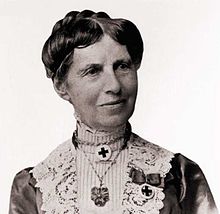
Born Clarissa Harlowe Barton
December 25, 1821
Oxford, Massachusetts, U.S.Died April 12, 1912 (aged 90)
Glen Echo, Maryland, U.S.Nationality American Occupation Teacher, Nurse, Humanitarian, Founder and first president of the American Red Cross Spouse none Signature 
Clarissa Harlowe "Clara" Barton (December 25, 1821 – April 12, 1912) was a pioneer American teacher, patent clerk, nurse, and humanitarian. She is best remembered for organizing the American Red Cross.
Contents
Youth, education, and family nursing
Clarissa Harlowe Barton was born on December 25, 1821, in Oxford, Massachusetts. Her father was Capt. Stephen Barton and her mother was Sarah (Stone) Barton and Clara was the youngest of five children (Dorothea b1804, Stephen b1806, David b1808, Sally b1811, and Clarissa b1821). Barton's father was a farmer and horse breeder who served as a captain in the Massachusetts militia, while her mother Sarah managed the household. The two later helped found the first Universalist Church in Oxford. Capt. Barton also served as a selectman in Oxford, MA. Barton preferred riding her father's horses and playing outdoors to playing 'house'.
When Barton was eleven, her brother David became her first patient after he fell from a rafter in their unfinished barn. Barton stayed at his side for three years and learned to administer all his medicines, including the "great, loathsome crawling leeches".
As she continued to develop an interest in nursing, Barton may have drawn inspiration from stories of her great-aunt, Martha Ballard, who served the town of Hallowell (later Augusta), Maine, as a midwife for over three decades. Ballard helped deliver nearly one thousand infants between 1777 and 1812, and in many cases administered medical care in much the same way as a formally trained doctor of her era.[1]
On his death bed, Barton's father gave her advice that she would later recall:
- "As a patriot, he had me serve my country with all I had, even with my life if need be; as the daughter of an accepted Mason, he had me seek and comfort the afflicted everywhere, and as a Christian he charged me to honor God and love all kind. The door that nobody else will go in at, seems always to open widely for me."
Early professional life
Barton became a school teacher in 1837 teaching in the area for a dozen years in schools at Oxford, N. Oxford, Charlton, and West Millbury. In 1850, Barton decided to further her education at the Clinton Liberal Institute in New York. She moved to Massachusetts, had no free public schools. In one year the school became so successful the town built a new school and hired a male principal for twice Barton's salary. Upset by the inequity, Barton resigned her position and moved to Washington DC. From 1854 to 1855 she worked as the first woman clerk in the US Patent Office,[2] at a salary equal to men's salary. Subsequently, under political opposition to women working in government offices, her position was reduced to that of copyist, and in 1857, under the administration of James Buchanan, eliminated entirely.[3] After the election of Abraham Lincoln, having lived with relatives and friends in Massachusetts for three years, she returned to work at the patent office in the autumn of 1860, now as temporary copyist, in the hope she could pioneer to make way for more women in government service.[2]
American Civil War
On April 21, 1861, nine days after the start of the American Civil War, a trainload of Union soldiers was mobbed by Confederates in Baltimore, MD and arrived in Washington DC full of dead and wounded with no baggage or supplies. Barton tended to wounded soldiers (some from Massachusetts) quartered in the U.S. Senate chamber in Washington.[4][5] Then after the First Battle of Bull Run, July 21, Barton established the main agency to obtain and distribute supplies to wounded soldiers. She was given a pass by General William Hammond to ride in army ambulances to provide comfort to the soldiers and nurse them back to health and lobbied the U.S. Army bureaucracy, at first without success, to bring her own medical supplies to the battlefields. Finally, on August 3, 1862,[4] she obtained permission to travel to the front lines, eventually reaching some of the grimmest battlefields of the war and serving during the Siege of Petersburg and Richmond, Virginia. In 1864 she was appointed by Union General Benjamin Butler as the "lady in charge" of the hospitals at the front of the Army of the James. Among her more harrowing experiences was an incident in which a bullet tore through the sleeve of her dress without striking her and killed a man to whom she was tending.
American Red Cross
After the war, she ran the Office of Missing Soldiers, at 437 Seventh Street, Northwest, Washington, D.C. in the Gallery Place neighborhood.[6]
Barton then achieved widespread recognition by delivering lectures around the country about her war experiences. She met Susan B. Anthony and began a long association with the woman's suffrage movement. She also became acquainted with Frederick Douglass and became an activist for black civil rights. In 1869, during her trip to Geneva, Switzerland, Barton was introduced to the Red Cross and Henry Dunant's book A Memory of Solferino, which called for the formation of national societies to provide relief voluntarily on a neutral basis.
When Clara Barton returned to the United States, she inaugurated a movement to gain recognition for the International Committee of the Red Cross by the United States government.[5] When she began work on this project in 1873, most Americans thought the U.S. would never again face a calamity like the Civil War, but Barton finally succeeded during the administration of President Chester Arthur, using the argument that the new American Red Cross could respond to crises other than war.
Barton naturally became President of the American branch of the society, which held its first official meeting at her I Street apartment in Washington, DC May 21, 1881. The first local society was founded August 22, 1881 in Dansville, N.Y., where she maintained a country home.[7]
The society's role changed with the advent of the Spanish-American War during which it aided refugees and prisoners of the civil war. In 1896, responding to the humanitarian crisis in the Ottoman Empire in the aftermath of the Hamidian Massacres, Barton sailed to Istanbul and after long negotiations with Abdul Hamid II, opening the first American International Red Cross headquarters in the heart of Turkey. Barton herself traveled along with five other Red Cross expeditions to the Armenian provinces in the spring of 1896, providing relief and humanitarian aid. Barton also worked in hospitals in Cuba in 1898 at the age of seventy-seven.[8] Barton's last field operation as President of the American Red Cross was the relief effort for the victims of the Galveston hurricane of September 1900. The operation established an orphanage for children of the 6,000 dead, helped to acquire lumber for rebuilding houses, and teamed with the New York World newspaper to accept contributions for the relief effort. As criticism arose of her management of the American Red Cross, plus her advancing age, Barton resigned as president in 1904, at the age of 83. After resigning, Barton founded the National First Aid Society. On April 12, 1912 at the age of 90 she died in Glen Echo, Maryland with all her friends by her side.
Religious beliefs
Various authorities[who?] have called Barton a “Deist-Unitarian" or freethinker or deist. Although not formally a member of the Universalist Church of America,[9] in a 1905 letter to the widow of Carl Norman Thrasher, she identified herself with her parents' church as a "Universalist”.[10]
Clara Barton National Historic Site
In 1975, Clara Barton National Historic Site, located at 5801 Oxford Road, Glen Echo, Maryland, was established as a unit of the National Park Service at Barton's home, where she spent the last 15 years of her life. One of the first National Historic Sites dedicated to the accomplishments of a woman, it preserves the early history of the American Red Cross, since the home also served as an early headquarters of the organization. She was born in a house which is now a museum.
The National Park Service has restored eleven rooms, including the Red Cross offices, the parlors and Barton's bedroom. Visitors to Clara Barton National Historic Site can gain a sense of how Barton lived and worked. Guides lead tourists through the three levels, emphasizing Barton's use of her unusual home. Modern visitors can come to appreciate the site in the same way visitors did in Clara Barton's lifetime.[11]
See also
- Places named for Clara Barton
-
- Clara Barton School in Bordentown, New Jersey
- Clara Barton Drive in Fairfax Station, Virginia
- Barton Hall, Iowa State University
- Clara Barton Primary school in Oxford, MA
- Clara Barton subdivision of Edison, NJ
- Clara Barton Parkway in Maryland
- Clara Barton Rest Area in New Jersey
- Clara Barton District, a regional association of Unitarian Universalist Association member congregations
- Clara Barton Elementary School in Bronx, New York
- Clara Barton Elementary School in Cherry Hill, New Jersey
- Clara Barton Elementary School in Corona, California
- Clara Barton Elementary School in Alton, Illinois
- Clara Barton Elementary School in Anaheim, California
- Clara Barton Elementary School in West Mifflin, Pennsylvania
- Clara Barton Elementary School in Philadelphia, Pennsylvania
- Clara Barton Open School in Minneapolis, Minnesota
- Clara Barton School in Fargo, North Dakota
- Clara Barton Woods in Lake Clear, New York
- Clara Barton Street in Dansville, NY
- Clara Barton High School in Brooklyn, New York
- Clara Barton High School in Elizabeth, New Jersey
- Clara Barton Community Center, Cabin John, MD
- Clara Barton First Aid Squad, Edison NJ
- Barton, a crater on Venus
- Barton's Crossing, Pittsfield, MA
- Barton Center for Diabetes Education, North Oxford, MA
- Barton Hall at Montclair State University in Upper Montclair, New Jersey
Published works
- Barton, Clara H. The Red Cross-In Peace and War Washington, D.C.: American Historical Press, (1898)
- Barton, Clara H. Story of the Red Cross-Glimpses of Field Work New York: D. Appleton and Company, (1904)
Notes
- ^ Ulrich, Laurel Thatcher. A Midwife's Tale: the Life of Martha Ballard, Based on Her Diary, 1785-1812. 1990.
- ^ a b Clara Barton, Dictionary of Unitarian & Universalist Biography
- ^ Clara Barton, www.civilwaracademy.com
- ^ a b "Clara Barton Chronology 1861-1869". Clara Barton National Historic Site. http://www.nps.gov/clba/forkids/chron2.htm. Retrieved 8 September 2011.
- ^ Epler, Percy Harold (1915). The Life of Clara Barton. Macmillan. http://books.google.com/books?id=LC5x31cCf_sC. Retrieved 2010-09-28.
- ^ http://dcwriters.poetrymutual.org/Pages/barton.html
- ^ Marks, Mary Jo. "History". American Red Cross Clara Barton #1. http://www.redcrossclara.com/History.html. Retrieved 2009-01-11.
- ^ Oates, Stephen B. (1994). A Woman of Valor. Macmillan. p. 382. ISBN 0-02-923405-0.
- ^ Russell E. Miller -The larger hope: the first century of the Universalist Church in America 1979 "Although not formally a Universalist by church membership, she had come of a Universalist family, was sympathetic to the tenets of the denomination, and has always been claimed by it.124 Known as "the Florence Nightingale of our war",
- ^ "Positive Atheism website". http://www.positiveatheism.org/mail/eml8886.htm. Retrieved 2007-05-25. source taken from The Universalist Leader 120/49 1938 My dear friend and sister: Your belief that I am a Universalist is as correct as your greater belief that you are one yourself, a belief in which all who are privileged to possess it rejoice. In my case, it was a great gift, like St. Paul, I 'was born free', and saved the pain of reaching it through years of struggle and doubt. My father was a leader in the building of the church in which Hosea Ballow preached his first dedication sermon. Your historic records will show that the old Huguenot town of Oxford, Mass. erected one of, if not the first Universalist Church in America. In this town I was born; in this church I was reared. In all its reconstructions and remodelings I have taken a part, and I look anxiously for a time in the near future when the busy world will let me once more become a living part of its people, praising God for the advance in the liberal faith of the religions of the world today, so largely due to the teachings of this belief. Give, I pray you, dear sister, my warmest congratulations to the members of your society. My best wishes for the success of your annual meeting, and accept my thanks most sincerely for having written me. Fraternally yours, (Signed) Clara Barton
- ^ "Clara Barton NHS - The House". National Park Service. http://www.nps.gov/archive/clba/house.htm. Retrieved 2007-05-25.
References
- Barton, William E. The Life of Clara Barton Founder of the American Red Cross New York: AMS Press, (1969)
- Hutchinson, John F. Champions of Charity: War and the Rise of the Red Cross Boulder: Westview Press, Inc., (1996)
- Joyce, James Avery. Red Cross International and the Strategy of Peace New York: Oceana Publications, Inc., (1959)
- Pryor, Elizabeth Brown. Clara Barton: Professional Angel Philadelphia: University of Pennsylvania Press, (1987)
- Ross, Ishbel. Angel of the Battlefield: The Life of Clara Barton New York: Harper and Brothers Publishers, (1956)
- Deady, Kathleen,W. "Clara Barton" Mankato:Capstone Press, (2003)
- Numbering All the Bones by Ann Rinaldi features Clara Barton and Andersonville Prison, a Civil War prison with terrible conditions.
- Safranski, Debby Burnett, "Angel of Andersonville, Prince of Tahiti: The Extraordinary Life of Dorence Atwater," Alling-Porterfield Publishing House, 2008
External links
- Harvard University Library Open Collections Program. Women Working, 1870-1930. Clara Barton (1821-1912). A full-text searchable online database with complete access to publications written by Clara Barton.
- Works by Clara Barton at Project Gutenberg
- Clara Barton National Historic Site
- Clara Barton Birthplace Museum
- The Barton Center For Diabetes Education, Inc.
- Clara Barton's House: Home of the American Red Cross, a National Park Service Teaching with Historic Places (TwHP) lesson plan
- Clara Barton's life in the Finger Lakes, NY
- Women in History
- Clara Barton Passport Application - 1869 (Original document image)
- Clara Barton, A Register of Her Papers in the Library of Congress
- Clara Barton at Find a Grave
Categories:- American humanitarians
- American nurses
- People of Massachusetts in the American Civil War
- Patent examiners
- People from Bordentown, New Jersey
- People from Worcester County, Massachusetts
- Women of the Victorian era
- American Civil War nurses
- 1821 births
- 1912 deaths
- People from Montgomery County, Maryland
- 20th-century Christian Universalists
- 19th-century Christian Universalists
Wikimedia Foundation. 2010.

